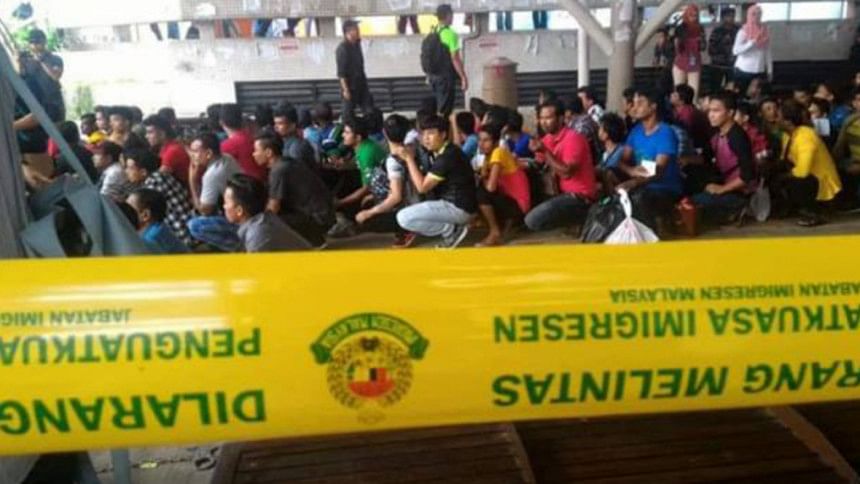Malaysia urged to stop crackdown

One hundred thirty labour rights and civil society organisations from different parts of the world yesterday demanded immediate suspension of Malaysia's crackdown on undocumented foreign workers.
In a statement, they said the drive would make the migrants, including Bangladeshis, more vulnerable.
The statement came a day after the Malaysian authorities announced that all the irregular foreign workers, held in the ongoing clampdown, would be deported immediately, without being granted the investigation period of between two and 14 days.
“It would impose a greater financial burden if the illegal immigrants are not immediately deported after being arrested,” said Malaysia's immigration department Director-General Mustafar Ali, after attending the department's monthly assembly in Putrajaya on Tuesday.
Every year, the Malaysian authorities have to spend over 25 million ringgit on meals for illegal migrants at 13 immigration depots across the country. The number of the workers is 6,678, he said.
Malaysia's immigration department began the nationwide operation dubbed “Ops Mega 3.0” on July 1, a day after it ended a rehiring programme that had begun on February 15, 2016. The programme had allowed the country's irregular foreign workers to regularise their visa status.
The new Malaysian government, which came to power early May, announced it wanted to reduce dependence on foreign workers as there was an oversupply of them in Malaysia, home to some six million foreign workers.
According to an official at the Bangladesh high commission in Kuala Lumpur, there are some one million Bangladeshi workers in Malaysia.
Of them, nearly five lakh are regular workers. Of the rest five lakh, many are under process of regularisation while many others have been defrauded by their agents or brokers.
In the operation, immigration police have detained 1,285 undocumented migrants and 16 employers until Tuesday, said Mustafar Ali, reports Bernama, state news agency of the Southeast Asian country.
Of those detained, some 250 are Bangladeshis, said the high commission official over phone. Besides, 600 other Bangladeshis, held before the drive, were also kept at the depots, the official added.
Against this backdrop, the migrant rights organisations urged the Malaysian authorities to immediately sit with them for a comprehensive solution to challenges regarding foreign workers.
Adrian Pereira, executive director of North South Initiative (NSI), a Malaysian rights body, issued the statement endorsed by 130 organisations and six individuals from Malaysia, Indonesia, Singapore, Cambodia, India, Nepal, the Philippines, Bangladesh, Australia, Jordan, Sri Lanka, Myanmar, Hong Kong and USA.
“We must never punish migrants who became victims of trafficking in Malaysia, as their circumstances are beyond their control. Criminalising victims and survivors is not the way to go; we should instead be going after the syndicates and those responsible,” it said.
Agents and brokers often provide the workers with false advice and promises regarding the process of getting work permits and jobs in Malaysia. Many migrants become susceptible to fraud and deception.
Recruiters promise work permits and good employment contracts with decent wages and conditions, but migrants often find their contracts, workplaces, and terms and conditions changed.
“For most workers there is little access to justice or right to redress mechanisms in proving the fraud and deception,” said Adrian.
Passports are often illegally held by employers and whether their visas are renewed or not is beyond the worker's control -- a situation that makes the migrants undocumented, the statement said.
Again, the previous Malaysian government's hiring policy required an employer's consent for workers to change jobs. This inflexibility is particularly problematic in cases of exploitation, intimidation and physical violence where workers have no choice but to abscond and become undocumented.
Many migrants also paid high recruitment fees to the syndicates, and were facing debt bondage.
“Sending people home in such circumstances is putting many workers at risk, and this needs to be clearly addressed,” the statement said.
“Unrealistic deadlines force workers to risk going underground, collaborating with exploitative actors within the labour supply chain, driving criminality and other high-risk activities,” it added.

 For all latest news, follow The Daily Star's Google News channel.
For all latest news, follow The Daily Star's Google News channel. 



Comments